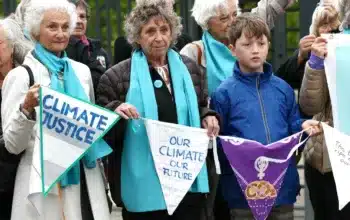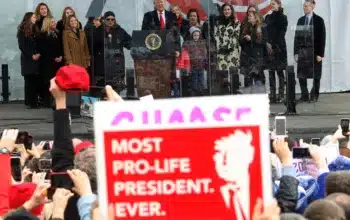
Democrats stayed home in 2014 and today’s Supreme Court is the result.
Four weeks before the 2014 election, the Pew Research Center released a report detailing the American public’s disinterest in the campaign:
Midterm elections rarely excite the general public, but 2014 is shaping up to be an especially underwhelming cycle for many Americans. With about a month remaining in the congressional races, 15% are very closely following news about the midterms — down from similar periods before the elections in 2010 (25%) and 2006 (21%).
Pew called it the “Meh Midterm,” and they were proven right: When the votes were counted, weeks later, turnout was 36.3 percent — the lowest it had been in 72 years. “Neither party gave voters an affirmative reason to show up at the polls,” complained the New York Times. Some commentators — like, well, me — argued that there was no such thing as a dull election when both the Senate and the Supreme Court were so closely divided, but such arguments fell on deaf ears.
The absence of enthusiasm favored Republicans: They picked up nine Senate seats, ripping control of the chamber away from the Democrats for the first time since 2006. And did it matter? It did. 466 days later, Antonin Scalia unexpectedly died, opening a vacancy that could’ve swung the Supreme Court for a generation.
Liberals will forever loathe Sen. Mitch McConnell for denying Merrick Garland so much as a hearing for the vacant seat. And they’re right to do so; McConnell insisted that a Supreme Court vacancy could never and should never be filled in an election year.
It was a ridiculous argument, and everyone knew it. Raise your hand if you believe McConnell and the Senate Republicans will refuse to confirm Trump’s nominee to replace Anthony Kennedy if his seat opens up in 2020. Anyone? I didn’t think so.
The truth was simpler: McConnell wanted a conservative Supreme Court and he had the power to protect that preference. McConnell could stop Garland because Democrats sat out the 2014 election, letting Republicans amass the votes needed to block Obama’s appointees.
I remember covering the 2014 election, and the narrative was that it just didn’t matter. Barack Obama had won reelection in 2012 and gotten filibustered on virtually everything he tried. Government was gridlocked, and no matter what happened, it was likely to stay gridlocked. Democrats were disappointed and disaffected. What was the point?
Turns out the Supreme Court was the point. The lure of an open Supreme Court seat is why many conservatives turned out for Donald Trump in an exceptionally close election; it’s possible that McConnell’s gambit elected Trump.
And Trump came through on his end of the bargain; he replaced Scalia with the exceptionally conservative Neil Gorsuch, and he’s promised to do the same with any other vacancies that come up, too. Democrats have won the popular vote in six of the past seven presidential elections, but conservatives continue to dominate the Supreme Court. If Trump gets another vacancy or two, they will do so for decades to come.
What that looks like was on display Tuesday, as the Supreme Court upheld Trump’s travel ban, arguing that the candidate who said he was banning Muslim travel to and from the United States was no longer motivated by anti-Muslim animus after he won the presidency. It’s an absurd claim, but the rationale is less telling than the split: 5-4, with the Court’s liberals voting against, and the Court’s conservatives, including Gorsuch, voting for.
And it’s not just the travel ban. This year, the Court has delivered a host of wins for conservatives. They’ve allowed Ohio to purge voters from the rolls, supported crisis pregnancy centers against state regulation, and they’re expected to deal a blow to public sector unions.
In April, McConnell was asked, by Kentucky Today, to name his most important achievement in public life. “The decision I made not to fill the Supreme Court vacancy when Justice Scalia died was the most consequential decision I’ve made in my entire public career,” he said.
McConnell was right. Many of these were 5-4 rulings, which is to say they’re not triumphs of legal reasoning, they’re triumphs of political power. These cases were decided not during oral arguments but during the 2014 midterms. The lesson of today’s Court rulings isn’t that McConnell is a jerk. It’s that midterm elections matter.
We are 133 days away from the 2018 election. Anthony Kennedy is thinking of retiring. The path to a Senate majority for Democrats is narrow, but given that they only need to pick up two seats, it’s certainly plausible. Assuming Kennedy doesn’t step down before the election, they have the opportunity to wield the same power Mitch McConnell did over his replacement — but only if Democrats learn the lesson of 2014 and turn out to vote.
Go deeper
• “America after Anthony Kennedy.” Read Dylan Matthews’s excellent piece on Vox about what the Supreme Court will look like if Trump replaces Scalia.
• “How Democrats missed a chance to reshape the Supreme Court for a generation.” This is what likely would’ve happened if Hillary Clinton had won, and Democrats had named Scalia’s replacement. Again, elections matter, if for no other reason than the courts.
• It’s not just the Supreme Court. Rorie Spill Solberg and Eric N. Waltenburg looked at Trump’s judicial appointments at all levels and concluded: “even if the GOP were to lose control of the Senate in November’s elections, Trump will have changed the federal judiciary, especially the courts of appeals. His legacy will be a more conservative and less diverse appellate bench.”
Read More
https://cdn.vox-cdn.com/community_logos/52517/voxv.png


